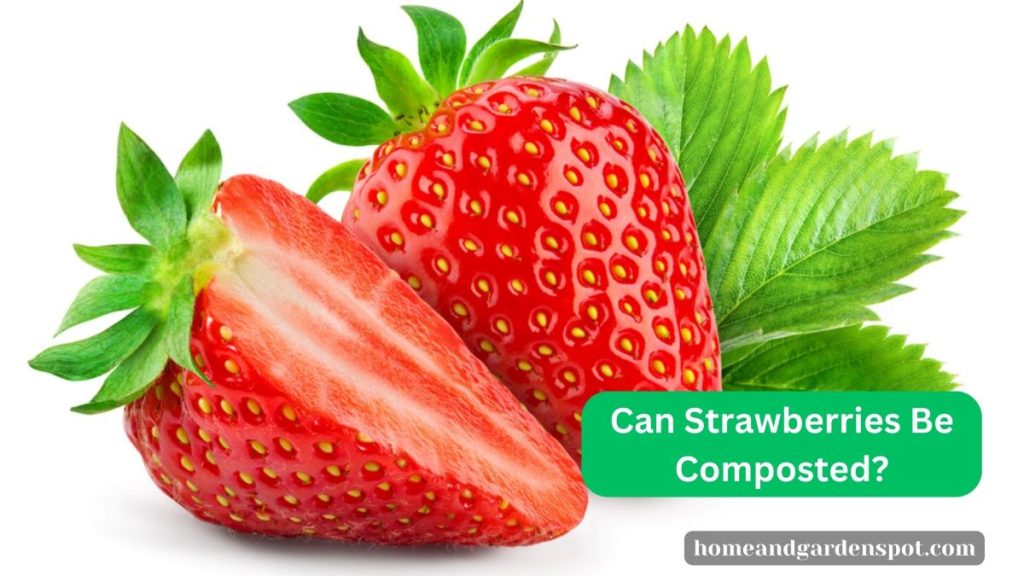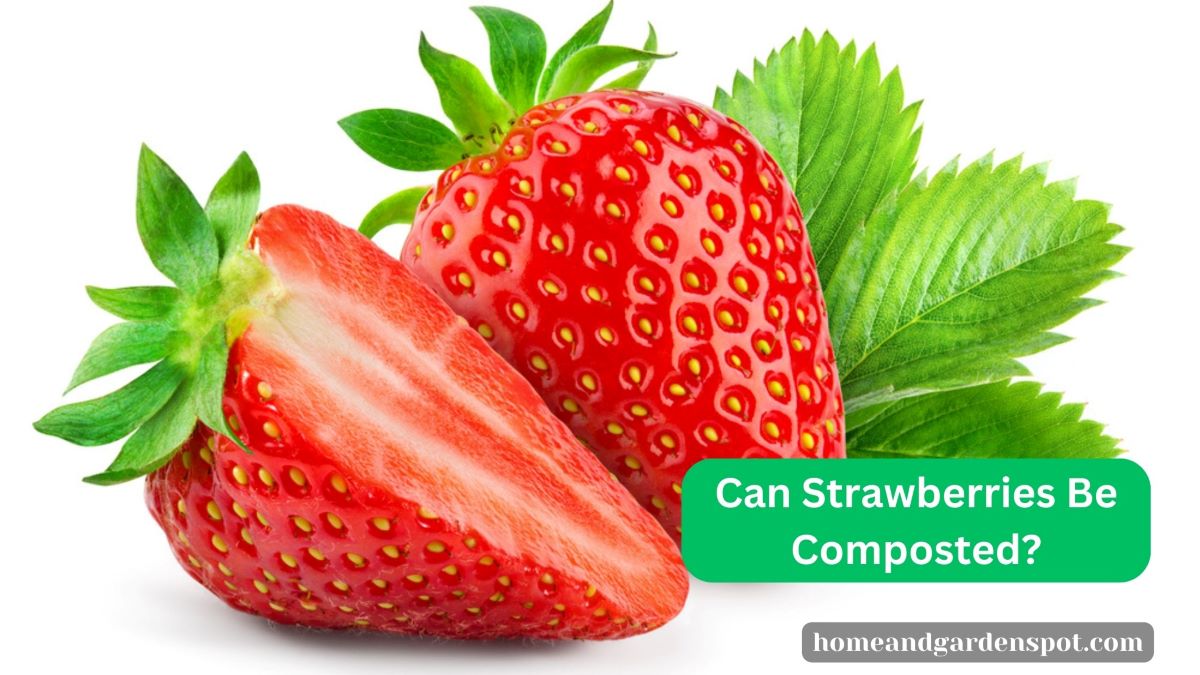For years, I’ve witnessed the incredible transformation of kitchen scraps and garden waste into nutrient-rich black gold, enhancing the vitality of my plants.
Today, we’ll explore a question that has interested me and may have crossed your mind: Can we compost strawberries?
When it comes to composting, strawberries can be included in your compost pile.
They are suitable for composting because they have a balance of nutrients that contribute to the composting pile.
They have a high nitrogen content, which benefits the soil and is a fertilizer for your plant.
In this blog post, I will discuss how to compost your strawberries and provide tips for successful composting.

How to Compost Strawberries
To compost strawberries effectively and make the most of their nutrient-rich goodness, follow these steps:
1. Collect the Strawberry Scraps
Begin by collecting strawberry scraps, including the tops, stems, and overripe or damaged strawberries.
It’s essential to use organic strawberries free from pesticides or herbicides to ensure the health of your compost pile.
2. Add Carbon-Rich Materials
Balance the nitrogen-rich strawberry scraps by incorporating carbon-rich materials into your compost mix.
These materials include dry leaves, straw, shredded paper, or cardboard. Carbon-rich components provide the necessary balance for efficient decomposition.
3. Include Nitrogen-Rich Materials
Enhance the composting process by introducing nitrogen-rich materials.
This can include grass clippings, vegetable kitchen scraps (excluding meat and dairy), or coffee grounds. These materials accelerate decomposition and promote the breakdown of organic matter.
4. Layering
Building your compost pile in layers is key to creating a balanced and productive composting environment.
Start with a thick layer of carbon-rich materials at the bottom of your compost bin or pile.
You might care to know that compost piles have the ability to generate heat due to the activity of microorganisms.
5. Add Strawberry Scraps
Place the collected strawberry scraps on top of the nitrogen-rich layer. If you have large strawberries, consider chopping them into smaller pieces before adding them to the pile.
This helps speed up decomposition by increasing the surface area exposed to microbes and enzymes.
6. Alternate Layers
Continue to alternate between layers of carbon-rich and nitrogen-rich materials.
Maintaining a balanced ratio of these components ensures efficient decomposition and prevents the pile from becoming too compact or odorous.
7. Monitor Moisture and Aeration
Proper moisture levels and aeration are critical for successful composting. Ensure that your compost pile remains moist but not overly wet.
Regularly turn the pile using a pitchfork or shovel to introduce oxygen, essential for the activity of beneficial microorganisms responsible for decomposition.
A well-aerated pile breaks down organic matter more quickly and prevents unpleasant odors.
Benefits of Composting Strawberries
Composting strawberries can be a game-changer in your gardening and sustainability efforts.
This eco-friendly practice not only reduces waste but also provides a host of benefits that can significantly enhance the health and productivity of your garden.
Here are some of the key advantages of composting strawberries:
1. It Gives Rich Nutrient To The Soil
Strawberries are naturally rich in nutrients like potassium, phosphorus, and nitrogen.
When you compost them, these nutrients are recycled and reintroduced into your garden soil.
As a result, your plants receive a steady supply of these vital elements, promoting healthier growth and more bountiful harvests.
2. It Helps In Improving Soil Structure
Composting strawberries contributes to the improvement of soil structure. The organic matter in compost enhances soil’s ability to retain moisture, ensuring your plants have access to adequate hydration.
It also improves drainage, prevents waterlogging, and increases aeration, essential for root health.
3. It Enhances Microbial Activity
Introducing organic matter through strawberry compost encourages the proliferation of beneficial microorganisms in your soil.
These microorganisms break down organic materials, releasing nutrients in a form that plants can readily absorb.
This microbial activity creates a thriving ecosystem within your garden soil, further supporting plant health.
4. It Reduces Waste
Composting strawberries allows you to divert organic waste from landfills. Reducing kitchen and garden waste helps minimize the environmental impact on your household.
By composting, you play a vital role in reducing methane emissions from landfills, contributing to a more sustainable future.
5. Weed Suppression
Compost helps to suppress weed growth in your garden. Applying compost as a mulch or incorporating it into the soil creates a barrier that makes it more challenging for weeds to take root.
This reduces the need for chemical herbicides and manual weeding, contributing to a more eco-friendly gardening practice.
6. Erosion Control
The organic matter in compost helps bind soil particles together, reducing erosion risk.
This is particularly beneficial in sloped or vulnerable areas of your garden, where soil erosion can be a significant concern.
Composting strawberries aids in preserving your garden’s topsoil and preventing soil runoff.
7. Disease Suppression
Compost can have disease-suppressing properties.
While not a replacement for proper plant care and disease management, the beneficial microorganisms in compost can help create a healthier environment for your plants, potentially reducing the risk of certain soil-borne diseases.
8. Reduction in Chemical Fertilizer Use
With nutrient-rich compost from strawberries, you may rely less on chemical fertilizers.
This shift towards organic soil enrichment reduces the environmental impact of synthetic fertilizers while fostering a more sustainable and natural approach to gardening.
Potential Challenges in Strawberry Composting
Composting strawberries is an eco-friendly way to recycle organic waste and create nutrient-rich soil for your garden. However, there are a few challenges that you should be aware of:
1. Pests and Animals
Strawberries are attractive to pests and animals due to their sweet scent. When composting strawberries, precautions are essential to prevent attracting unwanted visitors, such as rodents or raccoons.
Consider using a compost bin with a secure lid or burying the strawberries deep within the compost pile.
2. Mold Growth
Strawberries have a higher moisture content compared to other compostable materials. This makes them more open to mold growth, which can slow down the decomposition process.
Ensure your compost pile is well-aerated and not overly wet to prevent mold growth.
3. Pathogens
Composting strawberries can also pose a risk of spreading plant pathogens if the strawberries are infected with diseases such as verticillium wilt or anthracnose.
To avoid this, avoid using diseased strawberries for composting.
How Long Does It Take For Strawberries To Decompose?
Strawberries are a quick-to-decompose fruit, and they can break down in a few weeks (mostly two weeks) or less than a month if the composting pile is ideal.
However, the time it takes for strawberries to decompose can vary depending on several factors, such as the size of the strawberries, the moisture content of the compost pile, and the carbon-to-nitrogen ratio.
Can You Put Strawberry Tops In A Compost Pile?
Yes, you can put strawberry tops in a compost pile. Strawberry tops, which include the green leafy parts and the stems, are organic matter and can be composted effectively.
Composting strawberry tops is a sustainable way to recycle this kitchen waste and turn it into nutrient-rich compost for your garden.
Why Do Strawberries Decompose So Fast?
Strawberries tend to decompose relatively quickly due to several factors:
1. High Water Content
Strawberries have a high water content, typically around 90% or more. This abundant moisture content makes them susceptible to microbial activity, essential for decomposition.
Microbes like bacteria and fungi thrive in moist environments and break down organic matter.
2. Sugar Content
Strawberries are naturally sweet and contain sugars like fructose and glucose. These sugars provide an energy source for microbes, further accelerating the decomposition process.
As microbes consume the sugars, they release enzymes that break down the strawberry’s organic components.
3. Thin Skin
Strawberries have a thin and delicate skin, which allows microbes to access the flesh more easily.
Unlike fruits with thicker skins or rinds, such as citrus fruits, the barrier to decomposition is minimal in strawberries.
4. Soft Texture
The soft and fleshy texture of strawberries makes them more prone to physical damage, which can release their juices and sugars, creating an ideal environment for decomposition.
5. Low pH (Acidity)
Strawberries have a slightly acidic pH, which can also contribute to faster decomposition.
Lower pH levels can facilitate the activity of acidophilic microbes, which are well-suited for breaking down organic matter in acidic conditions.
6. Surface Area
Their surface area increases significantly when strawberries are sliced, crushed, or blended.
This increased surface area provides more opportunities for microbes to come into contact with the strawberry’s organic components, speeding up the decomposition process.
7. Environmental Factors
Environmental conditions such as temperature and humidity can play a role in the rate of decomposition.
Warmer temperatures generally promote faster microbial activity, while adequate moisture levels are essential for decomposition.
What Is The Best Compost For Strawberries?
The best compost for strawberries is rich in organic matter, provides good drainage, and has a slightly acidic pH.
Strawberries are heavy feeders that require plenty of nitrogen and other essential nutrients to produce the best strawberries with the most nutritious fruits.
Here are some compost options that are suitable for strawberries:
1. Mixed Compost
A mixed variety of composts is ideal for strawberries. The best compost will have nitrogen from various sources available to the plant at different times. A mixture of well-rotted manure, leaf mold, and garden waste is ideal.
2. Chicken Manure Compost
Chicken manure compost is high in nitrogen and other essential nutrients that strawberries require.
It’s also rich in beneficial microorganisms that help break down organic matter and improve soil structure.
3. Mushroom Compost
Mushroom compost is an excellent source of nutrients for strawberries. It’s rich in potassium, phosphorus, and other essential minerals that promote healthy plant growth and fruit production.
Observation: When applying compost to strawberry plants, ensure the soil is well-drained and slightly acidic (pH 5.3 to 6.5).
Strawberries grow best in well-drained soil and need slightly acidic soil to thrive. If the pH needs adjusting, it takes up to an entire year for the amendments you apply to change the pH to the optimal level.
Soil pH is crucial because it means that your strawberry roots will be in optimal health and condition and can uptake the nutrients in your compost.
Conclusion
With their rich nutrient content and rapid decomposition, strawberries offer a valuable contribution to the composting process.
When combined with a balanced mix of carbon-rich and nitrogen-rich materials, strawberry scraps transform into nutrient-dense compost that enhances soil fertility, improves structure, and fosters healthier, more robust plants.
Composting strawberries reduces waste and exemplifies the principles of recycling and regenerating the Earth.
It is a simple yet impactful step towards a more sustainable lifestyle, demonstrating our commitment to responsible stewardship of the environment.

Leave a Reply